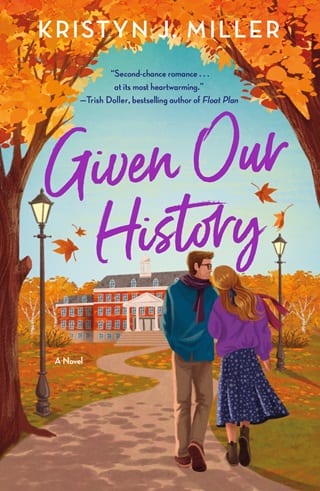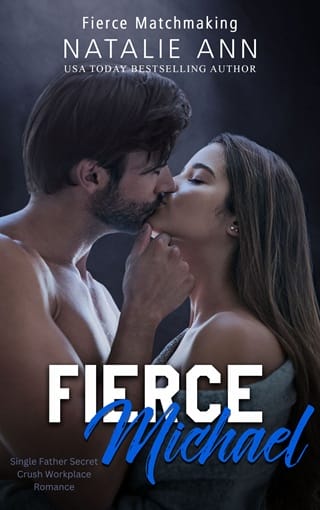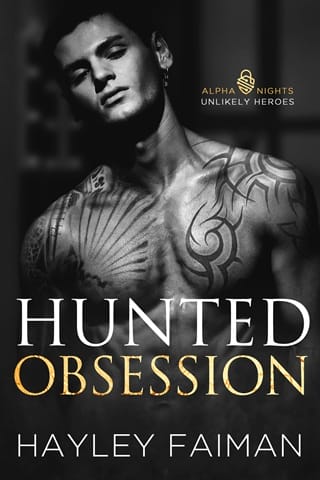Chapter 20
CHAPTER
20
PRESENT
Rain lashes my windshield as I search for a parking space, my wipers on full speed and fighting a losing battle. I squint through the downpour, but I’m not having any luck. I brake to let a family of four dressed as the Incredibles pass, Elastigirl gathering her children under a black umbrella.
I’d planned to arrive a couple hours early to finish prep, but Teddy insisted he had it handled and I’m not overeager to face him after the way we left off last night, so I took my time getting ready before heading to campus. But now the parking lot closest to the Alumni House is full, so it looks like I’ll have to park on the street. The world outside is dark and oil-slicked as I turn down one of the dark side streets, where the streetlights are shadowed by barren branches and a handful of cars dot the cut-stone curb.
I park and grab my compact umbrella off the passenger seat, craning my neck to check my reflection in the rearview mirror. My makeup looks good, courtesy of Reagan—a dramatic, vampy look with winged eyeliner and a bold lip. It’s the sort of makeup I wanted to wear in high school, only I didn’t think to look up YouTube tutorials, so I never quite got it right. I bare my teeth. Fangs: check. No lipstick on them either, which feels like an achievement. Enough stalling. I open the door.
When I step out of my car and into the gale, the storm nearly rips my umbrella from my hand. It feels like autumn’s been holding back; it’s hardly rained since August, so now it’s coming down all at once. My heeled boots clomp on the wet, uneven sidewalk as I find my footing, the concrete ravaged from beneath by gnarled, overgrown roots.
I send Bel a quick text as I power walk toward campus. Lot B was full. Walking that way now. How is everything?
She sends back a thumbs-up.
With my free hand, I fasten a couple of the snaps on my raincoat, which I’ve thrown over a knee-length black dress—the vampire costumes at the local Spirit Halloween weren’t exactly what I’d call work appropriate, so I had to get creative. I pass by a woman standing beside a minivan, her date holding an umbrella for her as she runs a lint roller over a flapper costume. Everyone’s still wearing their costumes, weather aside; I take that as a good sign.
The Alumni House is perched at the crest of a small hill in the oldest section of campus. A road winds between beech trees, but there are no streetlights to guide guests—only the yellow glow of the building itself, reflecting off the wet asphalt. It’s a brick federalist home with twin chimneys, built in 1812, but it’s long since been updated—I cringe at the history lost—into an event space.
As soon as I’m sheltered from the rain by the porch, I shake out my umbrella and fold it before stepping into the traffic jam happening in the entryway. By nature, the gala is a town and gown event, so I’m surrounded by a handful of faces I recognize and plenty of faces I don’t. After a few hellos, I drop my umbrella at the umbrella stand and cut through the great room, where orange fairy lights twinkle near the ceiling. A dour oil portrait of the former university president hangs above the fireplace, the lacquer crackled with heat and age. Just above it, Bel’s strung up the banner: CULTIVATING COMMUNITY it reads, with the logos of our various sponsors on either side. The Bucky’s logo is blotted out, leaving a large, empty space. I feel a little guilty that we didn’t have time to replace it with Taverna Eliopoulos instead.
The air is thick with chattering voices. I shrug out of my coat and make my way into the kitchen. A foldout table is lined with foil chafing dishes of moussaka, vegetarian pastitsio, and grape leaves. People are standing in line with paper plates in hand. Behind the serving table, Teddy’s alone and looking a little harried. He’s not wearing his glasses tonight, dressed in a sort of drapey tunic covered with an apron. A crown of laurel leaves perches in his hair. This is bound to be a little awkward, but it’s now or never.
I jump behind the table. “A little on the nose, don’t you think?” I joke under my breath as I knot the apron, hoping to break the ice. I grab a serving spoon and take over the dolma tray.
“Don’t remind me,” he mutters. “The website called it a ‘Roman senator costume.’ I didn’t know we’d be serving Greek food when I ordered it last week.”
I withhold a laugh. “Et tu, Brute?”
“Don’t make me stab you with the spatula.”
I snort and he casts a tentative smile my way. As ridiculous as the costume is, it doesn’t look bad on him. His biceps are on full display, his skin bronzy against the alabaster fabric, and the rain has mussed his curls, making them a little unruly.
Bel pokes her head into the kitchen. She’s dressed as Velma from Scooby Doo , her hair in a short twist out. “The band just got here. They’re asking where you’d like them to set up.”
“Jinkies,” I say. “Tell them to set up in the great room.”
She peers at me over the top of her fake glasses, disapproving. “I know that’s what you said, but Goodman is complaining about the acoustics…”
I sigh, glancing over at Teddy. “I should go handle that.”
“I think I can manage without you for a couple minutes,” he teases.
I find the members of Eleventy-One Elephants standing around in the foyer. Their black instrument cases are flecked with rain and they’ve dressed up as—what else?—elephants. Goodman’s wearing a loose gray onesie, a rubber trunk affixed to his nose with a string, but he has the audacity to look me up and down and ask, “Who are you supposed be, vampire Martha Stewart?”
I fold my arms over the apron. “I’m helping in the kitchen. What seems to be the problem here?”
He waves a hand at the great room. “There’s too much clutter. Going to mess with the sound quality.”
We cleared a space for the band while we were decorating yesterday, but there’s still plenty of furniture for people to sit, the coffee table already littered with paper cups and plates. “You’ll just have to make do.”
It takes some back-and-forth, but once I’ve made it clear to the members of Eleventy-One Elephants that the great room is the only room large enough to host their six-person band, they relent. The rest of the night goes off without a hitch. I split my time between the kitchens and the rest of the party, shaking hands and thanking people for coming. Music drifts through the halls, mingling with conversation, but things quiet down when the president of the Alumni Association stands on an ottoman to make a brief announcement about the raffle. Afterward, Eleventy-One Elephants plays an alternative cover of “Thriller,” but with the exception of a possibly drunk group of older alumni dancing out of step, it’s not much of a crowd-pleaser.
We’ve nearly run out of food by the time Teddy unties his apron and joins the festivities. He wanders over to where I’m standing in the parlor, sipping water from one of the paper cups. “So,” he says. “All this for tenure.”
“For the scholarship fund,” I correct him. “The possibility of tenure is an added bonus.”
“Is it worth it?”
“What do you mean?”
He waves around the room, paper cup in hand. “This school. The job.”
“It’s tenure,” I say, like that should be the end of it. “It’s everything I’ve wanted. Everything I’ve worked for.”
“That’s like saying you’ve always wanted to get married. You don’t just marry the first person who comes along.” He fixes me with a serious look. “So, why Irving? There must be a reason.”
If we’re going with his simile, then Irving is the first person to come along. I’d applied to a number of schools, but this was the only one to offer me a position on the tenure track when I was still fresh out of grad school. It had seemed like a good enough reason, at the time. “They’ll help with Reagan’s tuition, once I’m tenured.”
“What about your parents?” he asks. “They can’t help at all?”
I wobble my head back and forth, noncommittal. “They’re doing better now, financially.” Better in general. “Dad’s still dealing with the whole worker’s comp nightmare, but Mom moved up to assistant manager a couple years ago. But they can’t afford this. And I hate the thought of Reagan drowning in loans.”
Teddy considers this for a beat. “I’m not sure that’s your responsibility.”
I stare at him. “She’s my sister.”
“Yeah, well.” He shrugs. “She’s an adult. If this is the school she chose, I’m sure she knew what she was signing on for.”
He’s not entirely wrong. I tried to encourage Reagan to apply to other schools, but she was set on Irving. Something about the old buildings, the intimate campus, appealed to her. Maybe because she’s a bit of a romantic at heart, no matter how much she tries to bury it beneath layers of snark. She is a literature major, after all. “Anyway, I don’t know why you’re questioning me,” I say, deflecting. “You’re on the tenure track at Carnegie, you seem to be happy enough.”
He shakes his head.
I frown. “No, what? No, you’re not happy?”
“I’m not tenure track. I’m adjunct.”
“What?” It comes out louder than intended, apparently, because several people in our immediate vicinity turn to stare. I lower my voice. “Why?”
“Well, my plans got sort of derailed after my dad had the first stroke,” he says, matter-of-fact. “It took me a couple years after that to finish my thesis. But I guess you could say I just haven’t found the right school yet.” He tosses me a cheeky grin. “Not ready to tie the knot.”
I shake my head and roll my eyes, but I can’t help smiling. We’re interrupted by Trina Madhani, who drags him away to meet one of her former advisees. I end up chatting with Wendy McAllister from the Communications Department about the renovations on Martin Hall, but I find that I keep glancing over at Teddy in the next room. After a little while, I excuse myself and cut through the crowd to take momentary refuge in the kitchen.
It’s empty except for Bel, eating what remains of the pastitsio directly out of the aluminum serving tray. My stomach grumbles just looking at it—I’ve been rushing around so much that I forgot to eat.
“Feels like it’s going well,” she says.
I pluck the last dolma out of the tray with my fingers and bite off the end, leaning my back against the counter as I chew. “Better than I’d hoped.”
“So,” she says slowly, “are you ever going to tell me what the story is with you two?”
She levels me with a significant look. I can’t pretend that I don’t know what she’s asking about. “We just—” I try to find the right way to sum everything up, to explain where it went wrong. “I was really focused on school.” She waits for me to elaborate, and for some reason, I do. “My mom, she was working this dead-end job at the time, and everything about it just looked so bleak. Not having anything for yourself. Counting on someone else to make it all better. I didn’t want to end up like that, so I sort of just put everything else on the back burner.”
As soon as I’ve finished talking, I feel like I’ve overshared. But Bel just nods, like she understands. “Right person, wrong time?”
“More or less.”
“But now it’s…” She waits a beat for me to fill in the blank, but I don’t. “The right time, maybe?”
I pop the rest of the dolma into my mouth and push off the counter. “I’m still trying to figure that part out.”
The remainder of the night is spent shaking even more hands, thanking donors, announcing the winners of the raffle. Guests begin filtering out by eight thirty. At eight forty-three, the band stops playing and Goodman steps outside with the bassist to smoke a joint beneath the portico, the rain coming down in sheets. Bel complains that she pulled a muscle hanging up the banner, so instead of asking her to stay to help clean up, I tell her to head home and draw herself a hot bath. I think she suspects that I’m doing this on purpose, but she doesn’t call me out for it.
By nine, it’s just me and Teddy. He heads upstairs to change back into his normal clothes and find his glasses. When he comes back down, he plays some music on his phone, a throwback playlist that fades into the background while we clean—“Famous Last Words” and “Demolition Lovers,” songs he used to send me on burned CDs. We exchange few words and fewer glances as we work. We’ll have to talk before the night is over, but for now, we crisscross through the rooms, boxing up decorations and bagging up trash, paper cups and plates that were left on the mantel and upright piano. I’m standing on a stepstool to reach the banner above the fireplace when he finds his way over to me.
“Looks like this is the last of it,” he says, staring up at the words CULTIVATING COMMUNITY .
I tug a pushpin out of the horsehair plaster and the top left corner of the banner flutters over my hand. “Can you grab the other end?” I ask.
He reaches to help and then I climb down from the stepstool. We meet in the middle, lining up the corners of the banner, which he folds and sets aside. I cross over to the coffee table and pop my fake fangs from my teeth one at a time, stowing them in a plastic bag in my purse.
When I turn back around, Teddy’s offering me a hand, palm up.
I stare at him, wary. “What are you doing?”
“I’m asking you to dance.”
A surprised laugh sputters out of me. I’ve never been asked to dance in my life—there’s no prom when you’re homeschooled, and the last wedding I attended was when I was the flower girl for my aunt Gillian when I was eight. “You want to slow dance to ‘Ohio Is for Lovers’?”
A smile tugs at the corner of his mouth. “You do look the part.” I roll my eyes and turn away, but then he adds, “You look beautiful.”
I hesitate.
“I’ll put on whatever song you like,” he says. “It doesn’t matter to me as long as I get to dance with you.”
“I can’t dance,” I say.
“I’m not sure there’s much to it.”
“You’re not sure,” I echo, arching a brow.
“Pretty sure I’m supposed to lead anyway, so you’re not the one who should be worried.”
I should probably decline, insist that we talk things out first. But there’s something so tempting about just giving into impulse for once, so instead I’m letting him lead me to the middle of the faded Turkish rug. We don’t even bother changing the music. His hand settles on my hip, drawing me toward him, and we sway out of time. Like we’re dancing to a song that only we can hear, something soft and slow.
I stifle a giggle.
“What?” he asks.
“This is ridiculous,” I say, nodding in the direction of the music playing from his phone.
“I don’t care,” he says.
I focus on our shoes, sobering. I’m all too aware of how close we’re standing.
“I’m sorry for last night,” he says after a moment. “For how I reacted.”
I shake my head. “I’m sorry for bringing it up the way I did.”
“You don’t need to apologize. Everything you said was true.” The hand on my waist drags me in close, so that our bodies are almost flush. He mutters into my hair. “I should’ve paid more attention to how you were feeling, back then. I had tunnel vision. All I could think about was how unfair everything was, and when I called that night—I thought that if you were here, if I talked you into coming home, then at least I still had you.” He takes a deep breath, chest rising and falling against mine. “It was selfish thinking. I’m sorry for taking it out on you.”
I rest my cheek against his shoulder, absorbing everything he’s telling me. His heartbeat is strong and steady. Him holding me like this, being this close to him, it does something to me. A weakening of my resolve, or maybe a strengthening of it—that all depends on what I actually want, and I’m not sure I’ve figured that out yet. “Can I ask you something?” I say finally.
“Anything.”
“Why are you here? You could’ve applied to work as a visiting scholar at any number of universities. But you chose this one.”
“I might’ve mentioned something earlier,” he says, breath warm against my ear, “about how I haven’t found the right school yet.”
“And what do you think of Irving?”
“It’s the faculty that really makes a school.” He’s quiet for a minute. “I think, if you’re set on staying here, then maybe I should extend my visitation.”
I draw back so that I can look at him. “Teddy—”
“You have to know, it was never about the school, for me.” We’ve stopped swaying now, standing stock-still with our bodies pressed together. His eyes search my face. “The past couple years put things into perspective. The whole idea of building a better life, making sure it all goes according to plan, it’s all wasted if you miss out on the things that made that future worth building in the first place.”
“We knew each other a long time ago,” I whisper.
With a hand, he angles my face up, thumb brushing against my bottom lip and sending a shudder through me. “Then I guess we have a lot of lost time to make up for.”
He bends to kiss me.
 Fullepub
Fullepub 



